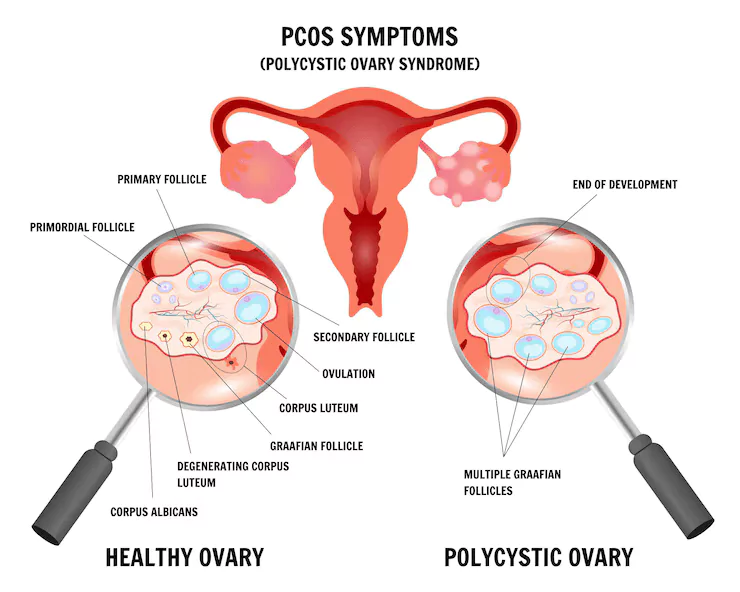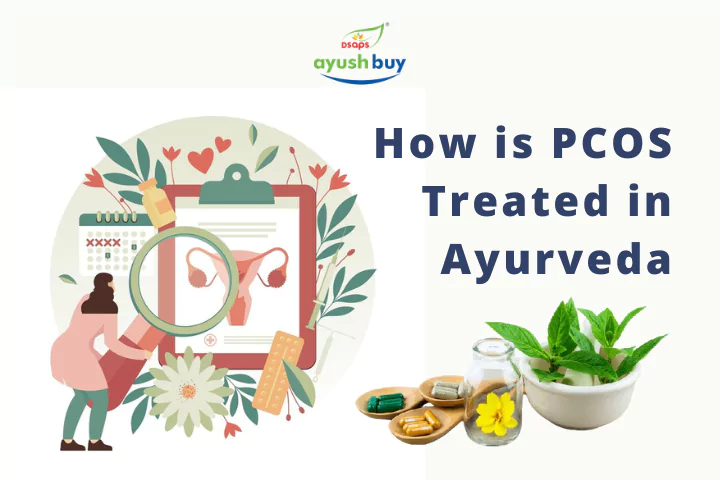Introduction
Polycystic Ovary Syndrome (PCOS) affects millions of women worldwide, with an estimated prevalence of 5-10% among women of reproductive age. This condition is characterized by hormonal imbalances, irregular menstrual cycles, and the presence of multiple cysts on the ovaries. While conventional treatments often focus on managing symptoms, Ayurveda offers a holistic approach that addresses the root causes of PCOS. In this blog, we’ll explore how Ayurvedic principles and treatments can help manage and potentially reverse PCOS.
Understanding PCOS in Ayurveda
Ayurveda, the ancient Indian system of medicine, views PCOS as a manifestation of dosha imbalances, particularly involving Vata, Pitta, and Kapha. According to Ayurveda, the health of an individual is governed by the balance of these three doshas. PCOS is primarily associated with an imbalance in Kapha dosha, leading to the accumulation of toxins (Ama) and disruption in the body’s natural processes.
Causes According to Ayurveda
- Poor Diet: Consumption of processed foods, excessive sugar, and unhealthy fats can aggravate Kapha.
- Sedentary Lifestyle: Lack of physical activity contributes to the buildup of Ama and Kapha imbalance.
- Stress: Chronic stress impacts hormonal balance and exacerbates dosha imbalances.
- Genetic Factors: A family history of PCOS can predispose individuals to this condition.

Symptoms of PCOS in Ayurvedic Terms
- Artava Kshaya (Menstrual Irregularities): Irregular or absent menstrual cycles.
- Agnimandya (Digestive Issues): Poor digestion and metabolism.
- Medoroga (Obesity): Weight gain, particularly around the abdomen.
- Anovulation (Lack of Ovulation): Difficulty in conceiving.
Ayurvedic Approach to Treating PCOS
Ayurveda emphasizes a holistic approach to health, integrating diet, lifestyle, and herbal remedies to restore balance and harmony. The treatment of PCOS in Ayurveda involves a combination of these elements tailored to an individual’s specific dosha imbalances.
Holistic Treatment
Ayurvedic treatment for PCOS aims to detoxify the body, balance hormones, and improve overall health. This approach is comprehensive, addressing not just the symptoms but the underlying causes of the condition.
Personalized Treatment Plans
Every individual is unique, and Ayurveda recognizes the importance of personalized treatment plans. An Ayurvedic practitioner will assess your dosha constitution and design a treatment plan that suits your specific needs.
Ayurvedic Medicines for PCOD and PCOS
Ayurvedic medicine offers a variety of herbs and formulations that can help manage PCOS symptoms and promote hormonal balance.
Key Herbs and Formulations
- Ashwagandha (Withania somnifera): Known for its adaptogenic properties, Ashwagandha helps reduce stress and balance hormones. It supports adrenal health and can improve symptoms of PCOS by reducing cortisol levels.
- Shatavari (Asparagus racemosus): This herb supports female reproductive health and regulates menstrual cycles. Shatavari helps in balancing estrogen levels and promoting fertility.
- Triphala: A combination of three fruits (Haritaki, Bibhitaki, and Amalaki), Triphala aids in detoxification and improves digestion, which is crucial for managing PCOS.
- Lodhra (Symplocos racemosa): Lodhra is beneficial for regulating menstrual cycles and reducing heavy bleeding. It also has anti-inflammatory properties.
How These Medicines Work
These Ayurvedic herbs work by addressing the root causes of PCOS, such as hormonal imbalances and inflammation. They help restore the body’s natural rhythm and support overall reproductive health.
Ayurvedic Dietary Recommendations for PCOS
Diet plays a crucial role in managing PCOS, and Ayurveda offers specific dietary guidelines to help balance doshas and improve health.
Dietary Guidelines
- Include: Fresh fruits and vegetables, whole grains, lean proteins, and healthy fats. Spices like turmeric, cumin, and coriander are beneficial.
- Avoid: Processed foods, refined sugars, excessive caffeine, and alcohol.
Sample Diet Plan
- Breakfast: Warm oatmeal with nuts, seeds, and a sprinkle of cinnamon.
- Lunch: Quinoa salad with mixed vegetables, chickpeas, and a turmeric dressing.
- Dinner: Grilled fish with steamed vegetables and a side of brown rice.
- Snacks: Fresh fruit, nuts, and herbal teas.
Lifestyle Modifications in Ayurveda for PCOS
In addition to diet, Ayurveda recommends specific lifestyle changes to support overall health and manage PCOS.
Daily Routine (Dinacharya)
A well-balanced daily routine promotes harmony in both body and mind.
- Morning: Begin with oil pulling and tongue scraping to detoxify. Practice yoga and pranayama (breathing exercises) to reduce stress.
- Daytime: Eat meals at regular intervals and stay hydrated.
- Evening: Engage in calming activities like meditation to promote relaxation and better sleep.
Exercise Recommendations
- Yoga: Poses like Bhujangasana (Cobra Pose) and Dhanurasana (Bow Pose) are particularly beneficial for reproductive health.
- Walking: A daily walk helps improve circulation and maintain a healthy weight.
Stress Management Techniques
Stress can worsen PCOS symptoms. Ayurveda recommends practices like meditation, mindfulness, and pranayama to manage stress effectively.
Ayurvedic Therapies for PCOS
Ayurvedic therapies provide additional support in managing PCOS by detoxifying the body and restoring balance.
Panchakarma
Panchakarma is a set of five detoxification therapies designed to cleanse the body of toxins and balance doshas.
- Vamana: Therapeutic vomiting to eliminate Kapha-related toxins.
- Virechana: Purgation therapy to remove Pitta-related toxins.
- Basti: Medicated enema to cleanse Vata-related toxins.
Other Therapies
- Abhyanga (Oil Massage): Improves circulation and helps in detoxification.
- Nasya (Nasal Administration): Clears sinuses and supports hormonal balance.
Success Stories and Case Studies
Real-life Examples
Many women have successfully managed PCOS with Ayurvedic treatments. For instance, a case study of a 30-year-old woman with PCOS showed significant improvement in symptoms after following a personalized Ayurvedic treatment plan for six months. Her menstrual cycles became regular, and she experienced weight loss and improved energy levels.
Expert Opinions
Dr. Anjali, a renowned Ayurvedic practitioner, states, “Ayurveda offers a holistic approach to managing PCOS. By addressing the root causes and promoting overall health, many women can find relief from their symptoms and lead healthier lives.”
Conclusion
Managing PCOS can be challenging, but with the holistic approach of Ayurveda, there is hope for achieving balance and wellness. Incorporating Ayurvedic principles and remedies can lead to significant improvements in symptoms and overall health. Discover Ayurvedic medicines for PCOD and PCOS at AyushBuy and start your journey towards better health today.
FAQs (Frequently Asked Questions)
Common Questions
Can Ayurveda cure PCOS completely?
Ayurveda can help manage and alleviate the symptoms of PCOS, but a complete cure depends on various factors, including the individual’s commitment to lifestyle changes and the severity of the condition.
How long does it take to see results with Ayurvedic treatment for PCOS?
Results can vary, but many individuals see improvement in symptoms within 3-6 months of consistent Ayurvedic treatment.
Are there any side effects of Ayurvedic medicines for PCOS?
Ayurvedic medicines are generally safe when taken under the guidance of a qualified practitioner. However, it is important to follow the prescribed dosage and recommendations.

